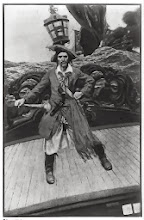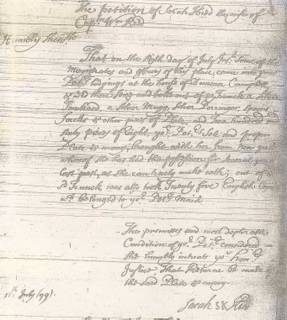Fading History
"Stat rosa pristina nomine; nomina nuda tenemus."
-De contemptu mundi by Bernard of Morlay
(Yesterday's rose endures in its name; we hold empty names.)
Thursday, January 20, 2005
Wednesday, January 19, 2005
Primary Sources
There is nothing quite like doing primary source research, as long as the topic is interesting. I obtained these documents from two fantastic sources, the Massachusetts State Archives and the London Public Records Office. If you like this stuff it is worth a visit to browse through the microfilm of forgotten letters and manuscripts, knowing that some have not been read in hundreds of years, nor were they ever meant to be. There is a lot of interesting historical information in these documents, snapshots of how people lived and worked and engaged in commerce. There is also an interesting look into the common thread of human emotion and experience that crosses the boundaries of the years and the cultures.
In the Sarah Kidd letter, from the Mass State Archives, Captain Kidd's wife pleads for the return of money which was taken from her when her husband was imprisoned. She was one of the wealthiest women in Manhattan and had just been transformed into a prisoner's wife and a single mother. Living off of dwindling funds and the good graces of those around her in Boston, Sarah tried in vain to secure her husband's release by various entreaties to government officials as well as discourse with ex-pirates Andrew Knott of Boston and Thomas Paine of Conanicut (Jamestown), Rhode Island. Kidd would not be released to his wife and daughter but would instead, as the victim of politics, underhanded business partners, a mutinous crew and his own poor choices, be hung in London following his trial in 1701.
In Kidd's Articles of Agreement, found in the London PRO, we see the ship's rules set forth in an agreement between crew and captain, back when Kidd was rounding up men for his government sponsored quest to hunt pirates. Note the bonuses for lost limbs and injuries, as well as the penalty for being drunk during battle. An arm or leg were worth several hundred pieces of eight, but failure to perform in an engagement meant no share. The ships manned by pirates and privateers were, in many ways, some of the first democratic institutions in the new world. Their society and it's rules were a stark contrast to the harsh and potentially tyrannical discipline maintained in the Royal Navy. Pirates shared loot relatively evenly, one share each with two or three shares going to ship's officers, surgeons & carpenters. Moreover, a key element of rule on a pirate ship was often the democratic election of the captain. As a privateer, Kidd bore more authority than an elected captain, but he still required the will of the ship's company for certain elements of discipline. In many ways Kidd was at the mercy of the majority, and it backfired on him in the end.
Joseph Palmer, whose signature is at the lower right hand corner of these articles, turned on Kidd upon his arrest and was a key witness against Kidd in his trial.
In the Sarah Kidd letter, from the Mass State Archives, Captain Kidd's wife pleads for the return of money which was taken from her when her husband was imprisoned. She was one of the wealthiest women in Manhattan and had just been transformed into a prisoner's wife and a single mother. Living off of dwindling funds and the good graces of those around her in Boston, Sarah tried in vain to secure her husband's release by various entreaties to government officials as well as discourse with ex-pirates Andrew Knott of Boston and Thomas Paine of Conanicut (Jamestown), Rhode Island. Kidd would not be released to his wife and daughter but would instead, as the victim of politics, underhanded business partners, a mutinous crew and his own poor choices, be hung in London following his trial in 1701.
In Kidd's Articles of Agreement, found in the London PRO, we see the ship's rules set forth in an agreement between crew and captain, back when Kidd was rounding up men for his government sponsored quest to hunt pirates. Note the bonuses for lost limbs and injuries, as well as the penalty for being drunk during battle. An arm or leg were worth several hundred pieces of eight, but failure to perform in an engagement meant no share. The ships manned by pirates and privateers were, in many ways, some of the first democratic institutions in the new world. Their society and it's rules were a stark contrast to the harsh and potentially tyrannical discipline maintained in the Royal Navy. Pirates shared loot relatively evenly, one share each with two or three shares going to ship's officers, surgeons & carpenters. Moreover, a key element of rule on a pirate ship was often the democratic election of the captain. As a privateer, Kidd bore more authority than an elected captain, but he still required the will of the ship's company for certain elements of discipline. In many ways Kidd was at the mercy of the majority, and it backfired on him in the end.
Joseph Palmer, whose signature is at the lower right hand corner of these articles, turned on Kidd upon his arrest and was a key witness against Kidd in his trial.




